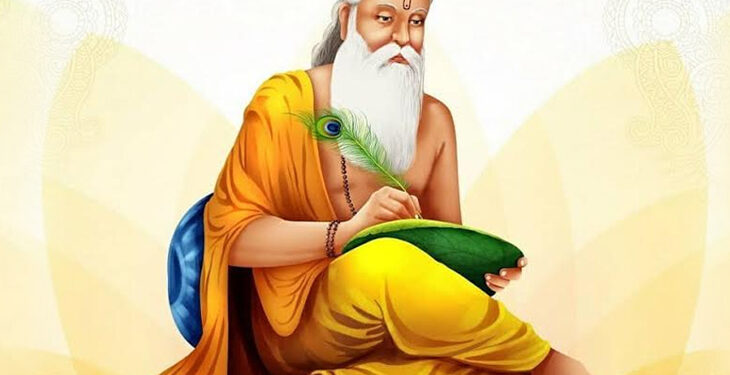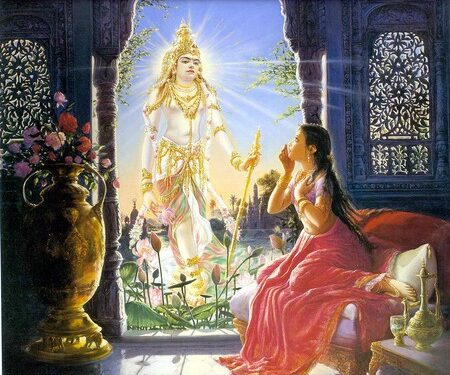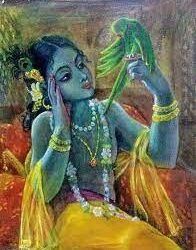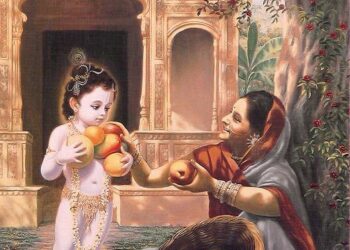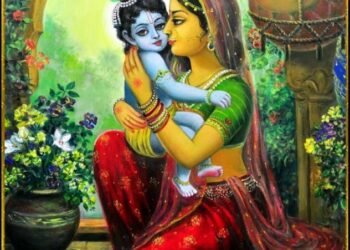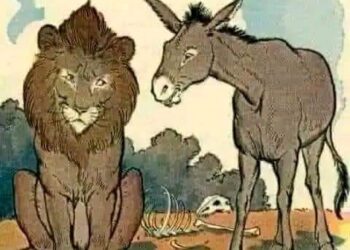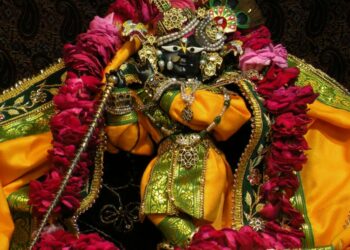Thousands of years ago there lived a hunter who made money by robbing other people. He lived in a jungle with his wife and children. No traveller who passed through the jungle was safe. The hunter didn’t hesitate to kill them and to steal their wealth.
One day Sage Narada passed through the forest. As usual, the hunter was on the look out for victims. As soon as he saw the holy man happily singing and playing on his vina, the villain thought, “Here is an easy chance to get rich!”. He jumped down from the tree where he was hiding and landed with a thud, right in front of the sage. Flashing his sword, he threatened, “Give me all that you possess. Otherwise I will kill you.”
Narada was the son of Brahma (the Creator) and he was never afraid of anyone. He saw God in all living beings and loved everyone. He looked kindly into the eyes of the hunter and asked, “Why do you want to kill me? I have never harmed you.”
The robber replied, “It is not because of anything you did that I want to kill you. I want your wealth so that I can look after my wife and children. Do as I say, or I will kill you.”
Narada was not disturbed by these threats. He replied, “Very well, my boy, you may do as you please. But kindly tell me one thing. You say that you are committing all this sin for your wife and children. They are taking the money earned by you. Will they also take the sins that you are earning?
The robber could not answer. He never thought of it that way. He replied, “Of course, they will have to! Why else should I commit sins for their sake?”
Narada shook his head in disagreement and said, “No, they will not. If you have any doubt, go and ask your wife and children.” The robber was suspicious. Maybe Narada was playing a trick, trying to escape. He sternly said, “No, I won’t leave go and just leave you here. You are trying to trick me and escape.”
Narada laughed and assured the thief , “No, my son, I promise you that I won’t escape. I will surely wait for you to return. If you don’t believe me, tie me up to one of these trees and go to your house.”
The robber tightly bound Narada to a nearby tree and hurried home. Ever since the sage asked him the strange question, his mind was disturbed. Had he been ruining himself through sinful activities, without gaining anything?
He went home and called out for his wife and children. He said, “My dears, you know how I had been earning money for you by robbing and killing. I have been sharing with you the money that I earned. Will you take the sins earned by me as well?”
The wife and children were horrified at the suggestion. They said, “We are your dependents and it is your duty to maintain us. We never asked you to commit sins for getting money. If you choose to commit sins, it is your own look out. How are we concerned with it? You alone will suffer the results of your crimes and your sins.”
Suddenly the eyes of the robber were opened. He realised that he was accumulating terrible sins from which there was no escape. Why should he lead a sinful life for these ungrateful people?
He ran back to Narada and, quickly untying the bonds, fell at his feet. Deep in grief, he begged, “O Great Soul, in ignorance I have committed many sins. Please tell me how I can save myself. I have no more desire to lead this life of sin. Please, save me.”
Narada rejoiced at the change in the hunter. He lifted the robber to his feet and told him, “Fear not, my son. There is one name, which saves even the greatest of sinners. Repeat this name with all your mind and soul.. All your sins will be washed away.” He then whispered in his ears the sacred name, “Rama” and asked the robber to repeat it.
For his whole life, the thief had only said harsh and unkind words. So, try as he might, he could not utter the word “Rama”. But Narada was too kind to leave him. So he tried another method. He slowly said the word “Mara”, which means ‘death’. This time the robber was very happy to say the word! He really liked it! He began saying it, over and over again. “Mara, Mara, Mara, Mara. And he started repeating the syllables in quick succession. . . “Mara, Mara, Ma-Ra, Ma-Ra, Ma, Ra, Ma, Ra, Ma, Ra-Ma, Ra-Ma, Rama, Rama.
Without realising it, the robber was repeating the holy name of Lord Rama. He was captivated by the charm of the sacred name and he went on repeating the name, forgetful of where he was. He sat like that for ages, without moving and without opening his eyes. Years passed away. Seeing him sitting like an immovable stone, ants, worms and insects crawled fearlessly near him. They built their homes and nests on his body. The anthills grew and grew until they covered him completely.
This long penance washed away all the robber’s sins. At last, within his heart, he saw, the beautiful form of Lord Rama. Overflowing with joy, he rose from his seat, knocking down all the anthills around him. Because he rose from anthills – called “Valmika” in Sanskrit – he came to be called ‘Valmiki’.
After that, Valmiki lived on the banks of the Ganges. One day, while he was returning from the river after his morning bath, he saw a couple of Krouncha birds flying joyously in the sky. They were in love. The hunter was charmed by the innocent joy of the birds and he stopped to watch them playing. Just then an arrow struck the male bird in the heart, and he fell down bleeding and crying. Seeing her mate gone, the female bird flew round and round his body, moaning and wailing. The bird’s grief was so pitiable, that it touched the sage’s heart. Tears flowed from his eyes and in his own heart he felt all the misery of the small bird as if it were his own. He looked around and saw a hunter crouching nearby. With unlimited compassion and sorrow, Valmiki cried out,
“O hunter, for killing the Krouncha birds, who were in love, your future will be very dark”
Then he suddenly stopped, surprised at his own words. For it was not his usual way of speaking. These words contained a rhythm and a melody. He realised that it was a poem that came out of his heart’s sadness. It was the first poem that he had ever composed. In fact, it was the first shloka (sacred verse) in the history of the world, for no one had written down any poetry before that day.
Valmiki later wrote the Ramayana, the story of Rama, in beautiful melodious metre. It is still sung by some Hindus every day, even though it was first written thousands of years ago. Valmiki is called the ‘Adi Kavi’, the first poet. All Hindu poets remember him before they begin writing a new poem.


